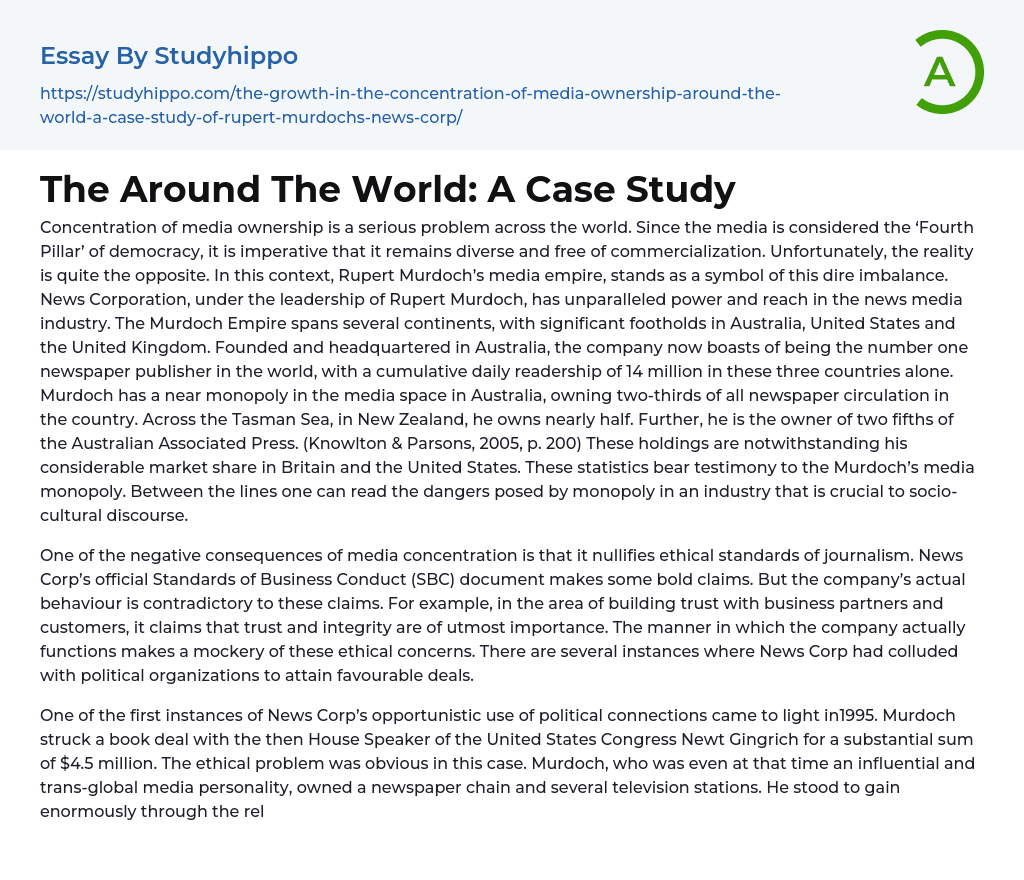Media ownership concentration is a critical global issue because the media plays a crucial role in supporting democracy. It is essential for the media to be diverse and free from commercial influences, but sadly, this is not the case. Rupert Murdoch's media empire represents this problematic situation. Under Murdoch's leadership, News Corporation has gained significant power and influence in the news media industry worldwide, especially in Australia, the United States, and the United Kingdom. Originating and based in Australia, News Corporation is now the largest newspaper publisher globally with 14 million daily readers solely in these three countries. In Australia, Murdoch controls two-thirds of all newspaper circulation and nearly half in New Zealand. He also possesses two-fifths of the Australian Associated Press. These statistics illustrate how extensive Murdoch's media monopoly is, which extends to Britain and the United States
...as well. Such monopolistic control raises concerns about its potential dangers to socio-cultural discourse within this vital industry.
Media concentration has a negative consequence of undermining ethical standards in journalism. News Corp's official Standards of Business Conduct (SBC) document makes strong statements, but the company's actions contradict these claims. One area where this contradiction is evident is in building trust with business partners and customers, where trust and integrity are claimed to be highly important. However, the company's actual behavior mocks these ethical concerns. News Corp has been involved in colluding with political organizations on various occasions to obtain favorable deals.
One of the initial instances of News Corp's opportunistic use of political connections came to light in 1995 when Murdoch struck a $4.5 million book deal with Newt Gingrich, who was the House Speaker of the Unite
States Congress at that time. The ethical problem in this case was clear. Even back then, Murdoch was a powerful and globally influential media figure, owning a newspaper chain and several television stations. His relationship with the Speaker had the potential to greatly benefit him. Only after facing significant public backlash did Gingrich decide to return the advance and opt for sales-driven royalties instead (Rohm, 2012, p.336). The continuation of this contract would have compromised the democratic political processes of the country. Events like these demonstrate the dangers posed by media concentration.
To understand the connection between media concentration and questionable business practices, one must examine the strategies used by Murdoch to establish his powerful empire. Murdoch has consistently been a controversial figure in the media industry since 1968, when he acquired a significant stake in News of the World through a deceptive stock deal (Sherrill, 1993). News of the World, the flagship weekly paper of News Corp in Britain, is known for its sensationalistic content. Another instance of unethical business behavior is evident when Murdoch purchased the New York Post from Dorothy Schiff in 1976. At the time of the acquisition, he assured Schiff that the newspaper's cherished liberal values and politics would be preserved. However, within a few months, the publication transformed into a hawkish right-wing newspaper, accompanied by a restructuring process that resulted in layoffs of local employees. These political affiliations cast doubt on the company's claims of objective and neutral reporting as stated in their brochures and annual reports.
News Corp has a reputation for having unfavorable employee relations. The company is known for frequent summary dismissals, which apply to all levels of
employees, from entry-level reporters to chief editors. It is made clear to everyone that their job security depends on aligning with the company's expectations. Any form of independent thinking or personal discretion is swiftly suppressed. Editors who exhibit independent judgment are at risk of being fired. Some editors have described Murdoch's management style as "by phone and by clone". This approach is particularly disturbing when individuals are going through personal difficulties or tragedies, as they become more vulnerable to termination. Additionally, Murdoch prefers to fire loyal subordinates through memos, usually delivered by a third party. This exemplifies the saying "absolute power corrupts absolutely". Without any opposition to question his decisions, Mr. Murdoch acts as he pleases. Concentrating power within an organization or individual can lead to authoritarianism and autocracy.
Murdoch’s ambition for business expansion has led to a ruthless approach in his functioning. While he may be charming and polite as a business personality, his business style and goals are far from agreeable. The reputation of his media conglomerate is tarnished, causing commentators and media analysts to view News Corporation's entry into the American media industry with mistrust and fear. This sentiment is shared by other leaders in the media industry, indicating a broader public distrust of the company's agenda for media concentration. Reading between the lines, one can discern the dangers of monopoly in an industry that plays a crucial role in society, culture, and political discourse. It is highly improbable for any business to establish a monopoly through fair and ethical means.
- Australian Culture essays
- National News essays
- The view essays
- Afghanistan essays
- Africa essays
- America essays
- Asia essays
- Australia essays
- Caribbean essays
- City essays
- Developing Country essays
- Dubai essays
- Earthquake essays
- Europe essays
- Fracking essays
- Georgia essays
- Middle East essays
- Natural Disaster essays
- New Zealand essays
- North Korea essays
- South Korea essays
- Thailand essays
- Travel essays
- Collaboration essays
- Dialogue essays
- Fake News essays
- Journalism essays
- Mass Media essays
- Media Analysis essays
- Media Bias essays
- Media Studies essays
- Message essays
- News essays
- Propaganda essays
- Radio essays
- Rogerian Argument essays
- Role of Media essays
- Social Media essays
- Social Media Marketing essays
- Social Networking essays
- Youtube essays
- Magazine essays
- Newspaper essays
- Academia essays
- Academic And Career Goals essays
- Academic Integrity essays
- Brainstorming essays
- Brown V Board of Education essays
- Brown Vs Board Of Education essays
- Coursework essays




